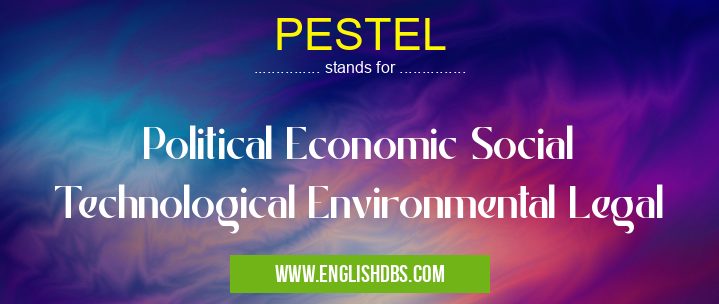What does PESTEL mean in POLITICS
PESTEL is an analytical framework used to assess the macro-environmental factors that influence a business or industry. It stands for:

PESTEL meaning in Politics in Governmental
PESTEL mostly used in an acronym Politics in Category Governmental that means Political Economic Social Technological Environmental Legal
Shorthand: PESTEL,
Full Form: Political Economic Social Technological Environmental Legal
For more information of "Political Economic Social Technological Environmental Legal", see the section below.
» Governmental » Politics
- Political
- Economic
- Social
- Technological
- Environmental
- Legal
PESTEL Meaning in Governmental
In the context of government, PESTEL analysis is crucial for policymakers to understand the external factors that shape public policy decisions. It helps governments assess the impact of factors such as economic growth, technological advancements, environmental regulations, and social trends on their policies and programs.
PESTEL Full Form
Political:
- Government policies and regulations
- Tax laws and incentives
- Political stability and corruption levels
Economic:
- Economic growth and inflation rates
- Interest rates and exchange rates
- Labor market conditions
Social:
- Demographics and population trends
- Cultural values and consumer behavior
- Education and healthcare levels
Technological:
- Technological advancements and innovation
- Automation and digitization
- Infrastructure and connectivity
Environmental:
- Climate change and its impact
- Resource availability and sustainability
- Environmental regulations
Legal:
- Laws and regulations governing business operations
- Intellectual property rights
- Employment and labor laws
Essential Questions and Answers on Political Economic Social Technological Environmental Legal in "GOVERNMENTAL»POLITICS"
What is PESTEL analysis?
PESTEL analysis is a framework that examines the external factors that influence an organization's operations. These factors include political, economic, social, technological, environmental, and legal aspects. It helps businesses understand the potential risks and opportunities that may impact their performance.
What are the components of PESTEL analysis?
PESTEL analysis consists of the following components:
- Political: Laws, regulations, government policies, and political stability.
- Economic: Interest rates, inflation, economic growth, and consumer spending patterns.
- Social: Culture, demographics, lifestyle trends, and education levels.
- Technological: Innovations, technological advancements, and the rate of technology adoption.
- Environmental: Climate change, environmental regulations, and resource availability.
- Legal: Laws, regulations, and legal frameworks that govern business operations.
How to conduct a PESTEL analysis?
To conduct a PESTEL analysis, follow these steps:
- Gather information from industry reports, news articles, and government sources.
- Analyze the potential impact of each factor on the organization's business and operations.
- Identify opportunities and threats that may arise from the external environment.
- Develop strategies to mitigate risks and capitalize on opportunities.
What are the benefits of PESTEL analysis?
PESTEL analysis offers several benefits, including:
- Enhanced understanding of the external business environment
- Improved decision-making by identifying potential risks and opportunities
- Increased adaptability to changing circumstances
- Proactive strategy development for managing external factors
- Identification of areas for innovation and growth
Final Words: PESTEL analysis provides a comprehensive framework for businesses and governments to understand the external environment and make informed decisions. By considering the interrelationships between these factors, organizations can anticipate changes and develop strategies to adapt and thrive in the face of evolving challenges and opportunities.
